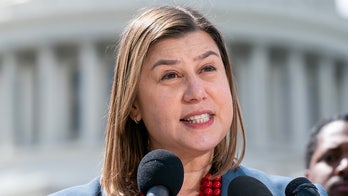WASHINGTON – Lawmakers complained Friday that the Bush administration is ignoring the will of Congress and slighting homeowners on the verge of foreclosure in its latest approach to spending $700 billion in economic rescue money.
"It's very clear that Treasury cannot and will not make the effort to keep people in their homes," said Rep. Darrell Issa, R-Calif., top Republican on the House Oversight and Government Reform subcommittee on domestic policy.
In the sole hearing on Capitol Hill Friday, Issa and others took turns pressing Neel Kashkari, Treasury's interim head of the $700 billion bailout package.
Rep. Dennis Kucinich, D-Ohio, chairman of the panel, said the Treasury Department had "abdicated its responsibility" to prevent home foreclosures.
He said the change in implementing the bailout announced by Treasury Secretary Henry Paulson this week "breaks with congressional intent, contradicts public assurances previously made by Treasury and leaves the federal government without an adequate mechanism to stem the tide of home foreclosures."
Congressional dissatisfaction is especially significant because Congress can block release of the second half of the rescue money, $350 billion, or put new conditions on its use. In addition to directing more money to distressed homeowners, Democrats are pushing for inclusion of funds to help the auto industry.
Paulson, citing the worsening credit crunch, said this week that Treasury no longer planned to buy up troubled mortgage assets, but was instead looking into ways to shore up credit-card, auto-loan and other nonbank businesses.
Kashkari defended the shift, saying "both banks and nonbanks may need more capital given their troubled asset holdings, continued high rates of foreclosures, and stagnant global economic conditions."
He also said that restoring stability to the overall financial system was the best way to help homeowners. If the government spent all $700 billion buying up mortgage loans, it would still reach only about 3 million of the 55 million mortgage loans in the country, he said.
Kashkari also was cool to proposals by the Federal Deposit Insurance Corp. to provide $24 billion in federal aid to companies lowering mortgage payments. The goal of the rescue plan was to make investments that eventually bring returns to the federal government, he said. The FDIC proposal "at the end of the day is a spending proposal" with no chance of getting the money back.
Kucinich and others also expressed concern that the bailout money was being used indirectly to fund the payment of bonuses, compensation and dividends by financial firms. Similar concerns were expressed at a Senate Banking Committee hearing Thursday where committee chairman Sen. Chris Dodd, D-Conn., stressed that "hoarding capital and acquiring healthy banks are not ... reasons why Congress authorized $700 billion in emergency funding."
President George W. Bush on Friday named a federal prosecutor to be a Treasury-based special inspector general to oversee the rescue plan and monitor how the money is spent.




